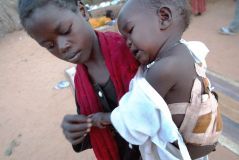Sudan govt says civilians killed in Darfur clashes
Oct 18, 2005 (KHARTOUM) — Rebels and Sudanese forces have clashed in North Darfur with artillery fire killing a number of civilians, the Sudanese government said Monday.
 The African Union, which is monitoring a shaky cease-fire deal between rebels and the government in the crisis-wracked Darfur region, said rebels attack attacked an army outpost early Sunday, which was followed by “heavy bombardment” apparently from Sudanese soldiers.
The African Union, which is monitoring a shaky cease-fire deal between rebels and the government in the crisis-wracked Darfur region, said rebels attack attacked an army outpost early Sunday, which was followed by “heavy bombardment” apparently from Sudanese soldiers.
The fighting took place southeast of the town of Kutum before Sudanese soldiers chased the rebel fighters from the Sudan Liberation Army into the nearby villages of Kenin and Nadi, the AU said in a statement.
But the Sudanese government accused “a group of armed movements in Darfur (of launching) waves of indiscriminate shelling” on Kutum, which resulted in “human and material damage” on Sunday and Saturday.
“The outcome was the death and injury of a group of children, women and elderly citizens,” said a statement issued by a Sudanese government delegation at Darfur peace talks in the Nigerian capital, Abuja. No casualty figures were provided.
The delegation said the rebel attack breached all peace agreements aimed at curbing the Darfur conflict, which began in February 2003. The United Nations estimates the fighting has resulted in the deaths of more than 180,000 people through violence, disease or malnutrition.
The AU also condemned the violence and urged restraint and cooperation from the warring sides to help it investigate the incident.
The United Nations, also concerned about the worsening violence, last week ordered all nonessential staff out of West Darfur, following a spike in attacks and kidnappings.
The Darfur conflict started after the two non-Arab rebel groups took up arms against the Arab-dominated government to win more political and economic rights for the region’s African tribes.
Sudan’s Arab government is accused of responding by backing Janjaweed militiamen who have carried out rapes and killings against Sudanese of African origin. The government denies backing the Janjaweed.
(AP/ST)
